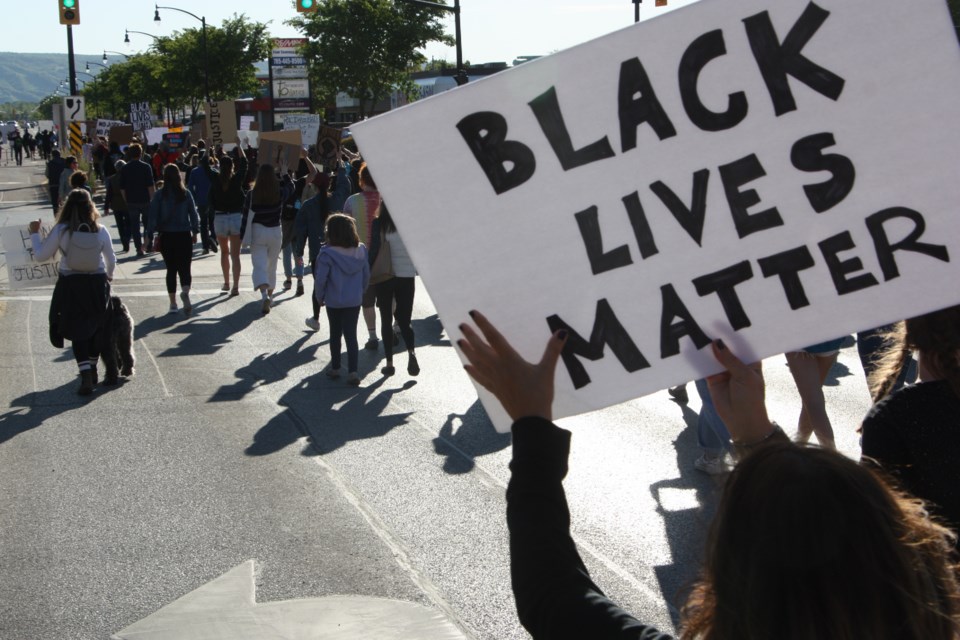When it comes to telling the stories of racialized groups, it can be difficult to use the most accurate words while also trying to use the least offensive terminology.
A lot of a journalists fight an internal struggle when it comes to language. This year, there have been many discussions in newsrooms across the county and the world when it comes to how to report on racism.
This struggle was exemplified by my recent foray into writing a series of features for CollingwoodToday.
For the past two and a half years, I’ve written a weekly column called People of Collingwood. The column started as a way for us to introduce ourselves as a news outlet to Collingwood’s movers and shakers, but has evolved over time into a column where people from different backgrounds tell stories of the town’s history through their personal experiences.
This year, Black Lives Matter protests cropped up all over the world including in Collingwood, sparked by the death of George Floyd in Minneapolis at the hands of police officers.
Later in the summer, Collingwood council voted to endorse the formation of the Unity Collective, a group of Collingwood citizens who would work together to consult and advise on diversity issues across town.
After talking with the group’s leadership, I endeavoured to do a block of columns in the People of Collingwood format where I interviewed the founding members.
Telling these stories brought its own set of challenges for me as a journalist.
Firstly, through COVID-19, I’m doing interviews primarily over the phone.
So, is it insensitive for me to outright ask someone, “Are you Black?”
Or even, “What is your ethnic background?”
It feels wrong to ask, but how would I engage with someone in an interview about racism and diversity if I don’t know their own personal background or experience?
I hear people say all the time that “they don’t see colour,” as an example of how not-racist they are.
However, I’m of the belief that ignoring difference also ignores lived experience, and it’s irresponsible to presume that white people and Black people don’t have massively different experiences growing up that have shaped who they’ve become, especially in a rural area.
For one of these columns, I interviewed a local Black woman who had recently joined the collective.
"I call myself a Negro. I don’t like the term Black," she said. “In my mind, black is not a colour for people. Black refers more to the movement, or the organization of people of colour.”
This interview started an hour-long conversation with one of my editors on how exactly I should write these three sentences.
Canadian Press (CP) style is a set of language guidelines that are followed by news outlets across the country.
Earlier this summer at the height of protests, CP made the decision to start capitalizing the word “Black” when referring to Black people and culture. Major publications, including Village Media, adjusted our own guidelines and made the change.
I would never use the N-word in a story. If it is used and we are quoting someone directly, our editorial style is to write it as “n----r”.
While this wasn’t the N-word, it was an N-word. Is it still OK for me to write it out?
The column runs in a question-and-answer format, so it is clear this is the word choice of the subject. Taking it out, in my opinion, could be akin to censorship, and who am I to make the call to censor someone speaking to their own experience? I opted to keep it in, although another editor put the entire section in additional quotation marks to make sure it was understood it was a quote.
Also, the capitalization of the word Black in this section has to vary according to CP style. It's lower case in the second sentence (because it's not referring to people), but capitalized in the other instances.
Style aside, I also knew the content of what the subject was saying might be controversial even within the Black community. There are many people of colour who are proud to call themselves Black.
Overall, the issue becomes how do I, as a white person, tell the stories of racialized groups without censoring their language?
I tend to lean toward letting people who have dealt with racism speak using their own words as often as possible. I make an effort to rarely paraphrase in these situations. The stories are powerful.
I debated whether to write this column or not, because the bottom line is, who cares how hard it is for me or my white colleagues to navigate these issues?
The focus should be on the people who actually have to live with these issues every day, and sometimes the best way to be an ally is to just shut up and let other people have the floor.
But at the same time, I worry that hiding this discourse, which I’m sure is happening in all kinds of conference rooms, both inside and outside of the news industry, is also a step in the wrong direction.
It’s difficult to talk about these issues sometimes, but I think it’s important to push through that difficulty.
Sometimes, we will struggle, but major cultural change is never easy.
